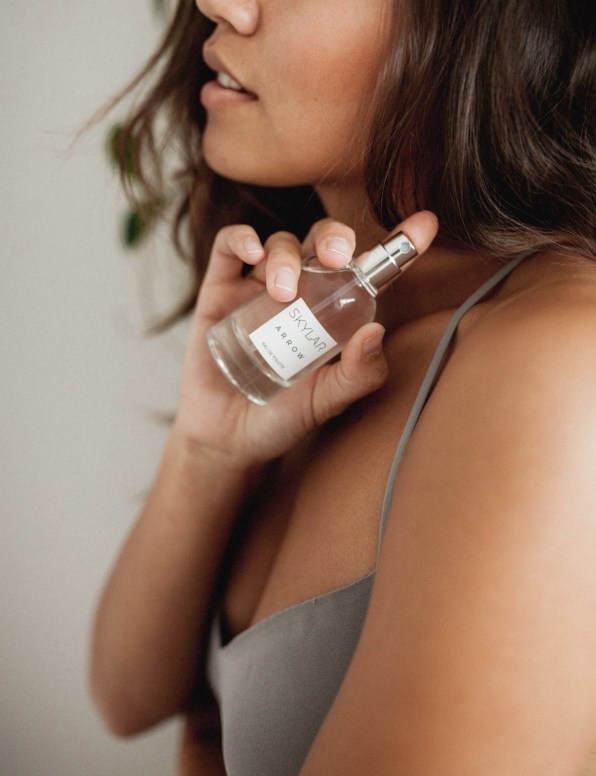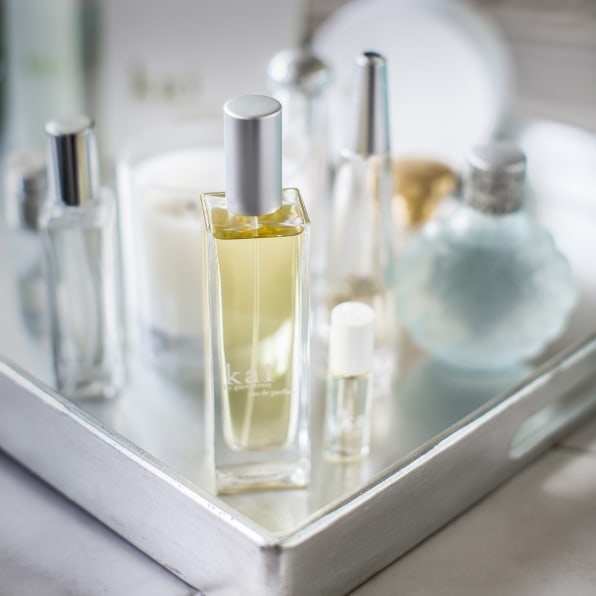A few years back, Cat Chen, the former head of operations at The Honest Company, was surprised when she had trouble finding a perfume for herself that wouldn’t set off her young daughter’s allergies. Nearly all chemical-laden scents would send the child into fits of sniffles and sneezes, even if Chen just held her briefly. This isn’t uncommon: Fragrance is the leading cause of skin inflammation, affecting more than 2 million Americans.
“I searched for a clean, hypoallergenic fragrance and I couldn’t find a good option,” she recalls—and she was not the only new mom with this dilemma, she soon found out. Some moms abandoned fragrance altogether. “A lot of women were looking for a better-for-you option.”
The frustrating experience inspired Chen to launch Skylar Body, a year-old, direct-to-consumer company devoted to vegan fragrances free of harsh chemicals. In lieu of parabens or phthalates, her line relies on natural oils and organic sugar cane alcohol. Scents come in “seductive” aromas with notes of vanilla, patchouli, and jasmine, or more zesty citrus scents from grapefruit and neroli. A 1.7-ounce bottle starts at $78.
Skylar is one of several startups targeting the wellness generation that demands fewer chemicals and more naturals in their products, be it facial cleansers or produce.

Six out of 10 women now read cosmetic product labels prior to purchase and 75% of millennial women say they favor buying natural products, according to a Harris Group poll commissioned by luxury brand Kari Gran. While skincare tops the natural product categories consumers find most important, 44% also think that the perfumes they spray on should be healthier.
“In terms of beauty, fragrance is definitely one of the things that sometimes women don’t think about,” says Chen, “but actually what you put into your skin, 60% of it is absorbed into your body.”
A spritz of Chanel No. 5 might not sound all that problematic, but it’s the culmination of all the products that is, says Romain Gaillard, cofounder of clean beauty retailer The Detox Market. The average woman uses 12 personal care products a day, containing roughly 168 chemicals. (Many of these ingredients are barely regulated, an issue that is now getting attention in Washington). The Detox Market sells more than 70 natural perfumes from little-known brands and beloved indie lines, starting at $30 all the way up to $225. Fragrances, he says, are now getting the same scrutiny as skincare.
“Today, people are much more cautious with their health,” notes Gaillard, who sees it gaining popularity with the same millennials who do yoga and drink green juice. “The natural extension of that is clean beauty.”
Back to the roots
The ingredients in many modern fragrances, most of them manufactured in the South of France, have always been a mystery, says Gaillard: “Basically, perfume means I’m not going to tell you what’s in it; it’s a trade secret.”
There are more than 3,000 registered fragrance components, all of which can be kept secret under International Intellectual Property trade law, according to BeautyCounter, a leader in the safer skincare and clean cosmetics category.
That’s become an issue, as for the past decades companies gradually used cheaper synthetic ingredients that had a longer shelf life. For centuries, perfumers depended on nature for what they bottled, but that dwindled as cost efficiency and quality liability took precedence. Such concerns are expected of more affordable products, which rely on slim margins.
Related: This perfume smells good–and does good
“It’s just like food: If you’re doing something natural, you won’t be able to mass-produce it cheap and send it everywhere and be on the shelf for a long time,” explains Gaillard. “But what’s happening now is luxury companies are forced to integrate natural ingredients because that’s what customers are looking for.”
Natural is also harder to produce because its more susceptible to variability. It makes production more complex for large companies, which is why so many indie and artisanal brands lead the sector–mimicking what we already see in the greater beauty industry.
In 2000, Alexandra Balahoutis founded Strange Invisible Perfumes after spending several years producing custom oil blends for clients. In the last two years, the botanical perfumery has grown into a cult favorite brand, known for its exotic 100% natural plant essences that go for $285 a bottle. The entrepreneur says customers appreciate the authenticity of the ingredients that have been “crafted” by nature.
“They feel very drawn to naturals because it’s the real thing,” Balahoutis tells Fast Company of her resistance to synthetic essences. “These plants had evolved over millions of years to exact their survival. There’s a mystique with naturals.”
Originally, Strange Invisible perfumes were made from a base of esprit de cognac, essentially the original perfumers’ alcohol that was used in the 15th century during the preindustrial revolution. It is cognac made from grapes that is then distilled, much like the winemaking process.
Balahoutis then took it one step further and partnered with a master distiller for an even cleaner and more organic alcohol. “We are so concerned with purity and with a lack of toxins,” she says of the company’s philosophy.
It also just makes for a better smelling product. Roses, for example, smell different in every region–they possess a multitude of aroma molecules that exist in slightly different ratio combinations. Balahoutis compares every one of those molecules much like a letter of the alphabet, with the whole alphabet spelling rose.
With traditional steam distillation, which many oils are subjected to in fragrance extraction, “you can get less than half of that alphabet,” Balahoutis explains, “but with hydro distillation you can really get the entire alphabet. These tiny fragile little aroma molecules in plants are very fragile and they’re what make a rose smell at its best.”
A nose for the finer things
Balahoutis says Strange Invisible fans are mostly women their 30s and 40s who crave originality and quality. They hail from all over the country, but the thing they have in common is their distaste for most perfumes on the market. Many of them, anecdotally, complain of avoiding department stores for exactly that reason–the onslaught of smells.
“There are a lot of people out there that are intuitively rejecting these very big, overbearing synthetic perfumes because their bodies get that there’s something wrong with them,” says Balahoutis. “It isn’t like a rare thing for people to dislike fragrance. Actually, it’s more the rule than the exception.”
Synthetic perfumes last longer on the skin than natural fragrances, which generally have a roughly four-hour life span. It’s precisely that reason why companies such as Los Feliz Botanicals produce portable 10-ml. bottles ($10), so that consumers can reapply at will.
“Natural perfume stays close to the skin, so that only those close to you can smell it,” reads the California-based company’s website. “A well-balanced perfume should lure others close to you, not repel them away.”
Of course, what specifically constitutes natural and organic is often up for debate, with different companies abiding by their own standards. Some use all naturals, others use a mix. Nearly all nix all harmful synthetic ingredients.
“The whole idea about clean and green is somewhat ambiguous because we don’t have very clear standards in our government,” says Jillian Wright, cofounder of the Indie Beauty Expo.
The multi-city beauty expo, which saw 600 exhibitors across all locations last year, has seen a dramatic increase in the fragrance category. While not all are verified natural, more and more brands are defining themselves as “clean” and offering transparency in their ingredient lists–exactly what’s going in their product and how it’s being made.
Skylar, for example, is 90% natural and organic. Chen explains that’s because some essential oils, like lavender or citrus, are among the biggest culprits in terms of allergies. In its place, the brand uses safe synthetic ingredients.
“A few years ago, a lot of people [said], ‘I want 100% all natural,’” says Chen, “and then more and more brands started to come out with products that have preservatives and safe ingredients that in some cases can be safer than natural ingredients. It’s not so black and white.”
The proactive consumer
Kai, the gardenia-infused fragrance beloved by Oprah and celebrities, mostly relies on natural oils, which it lists on its website. It’s free of parabens, phthalates, phosphates, sulfates, aluminum, microbeads, and gluten, but it’s not all natural.

“We get customers asking all the time to verify if our product is vegan, gluten-free, aluminum, or alcohol-free, etc.,” says Kai CEO and founder Gaye Straza via email. “Consumers are definitely taking a more proactive approach to researching ingredients and vetting the products they’re putting on their skin. I think people are drawn to Kai because it has clean ingredients without sacrificing the luxury of the product.”
No matter, a majority of natural ingredients still spells health–and luxury. Lurk Perfumes is one brand that built a base of millennial fans with 12 natural scents starting at $60. In the last year, Lurk’s wholesale growth increased over 20%, while web sales increased over 100%.
The line is made with 100% pure essential oils, resins, absolutes, and CO2 extracts infused in certified organic jojoba and pure organic alcohol. (Jojoba possesses several advantages: It doesn’t stain clothing, most closely mimics the natural oils in human skin, and acts as a natural preservative.) Various scents possess notes of cedar, tuberose, or “warming Black balsam.” One bottle description noted a fragrance was “juicy, fresh, and fun without compromising complexity or refinement.” It has a one-to-three-year shelf life.
Lurk founder Anne Nelson Sanford says her line appeals to the “modern organic lifestyle.”
“It’s a different way of making perfume–it’s not something that’s easy to mass-produce. And I think that there’s something really beautiful about that,” says Nelson. “I think that it really speaks to where a lot of people are with regard to wellness, and with regard to how they’re eating and shopping.”
A cleaner future
With demand increasing, more and more fragrance startups are sprouting in this popular indie circle. As it’s not an easy product to mass-produce, its scalability might scare off perfume conglomerates. But Nelson sees even the larger players starting to contemplate how to best incorporate the trend in coming years.
“I feel like you’re going to see a lot less of those larger mass-made perfumes,” predicts Nelson. “I see people more interested in being thoughtful about where they’re choosing to put their money what they’re choosing to put on their body and in their body. That seems to be more status and more meaningful to them.”
Clean beauty is the fastest-growing segment within the $1 trillion wellness beauty industry, reports the Global Wellness Institute. Big brands and retail conglomerates are being forced to consider alternative practices if they want to keep a competitive edge. In the last year, Sephora pushed Clean, the retailer’s new category free of toxic ingredients. Even CVS announced it will eliminate parabens, phthalates, and the most prevalent formaldehyde donors (preservative ingredients that can release formaldehyde over time) from nearly 600 beauty and personal care products by the end of 2019.
“Natural products are getting better and better. The progress has been huge,” stresses Gaillard. “Companies are upping their game. It might not be the majority, but it will take a chunk of the premium market.”
Fast Company , Read Full Story
(56)